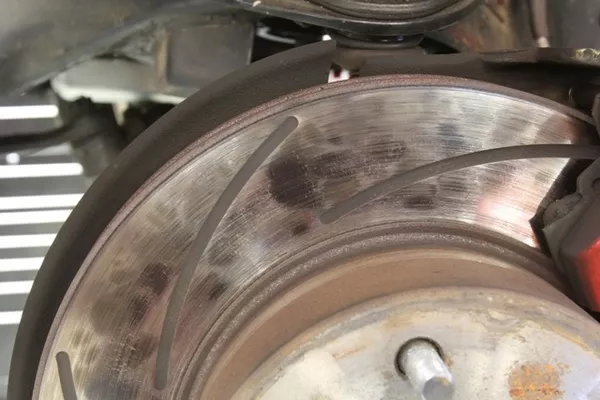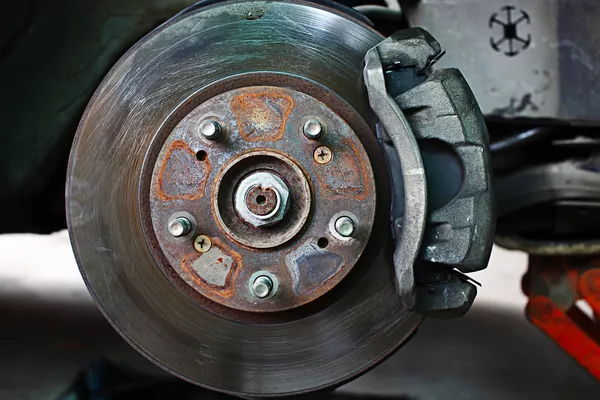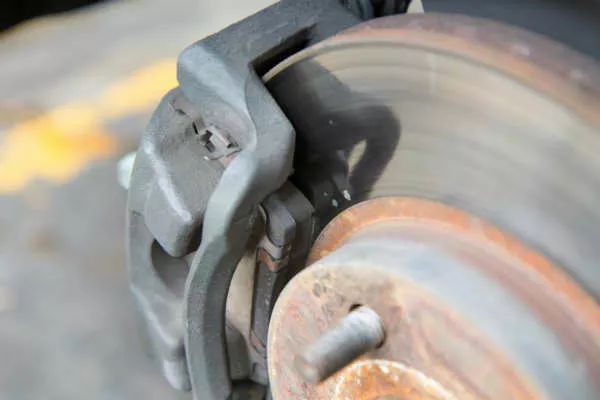Your brake pads and rotors are two of the elements that provide your car with the stopping power it needs. Like everything else, there are factors that you need to consider when it comes to changing these two components.
How long your pads and rotors last depend on how you use them. Most experts advise that you should change your brake rotors every 80,000 kilometers. If you’re not sure whether it’s time to change your brake components or not, Philkotse.com lists down a guide you can use as a reference.
1. How Do Brake Pads and Rotor Work?
Brake pads and rotors slow down and reduce the car’s momentum by using friction. By stepping on the brake pedal, you are making the brake pads clamp against the disc rotors that are rotating along with the wheels, slowing down and eventually stopping the rotation.

Brake pads and rotors slow down and reduce the car’s momentum by using friction
Kinetic energy is converted to thermal energy, which in most cases is lost. In Formula 1 racing, a Kinetic Energy Recovery System (KERS) is used to harvest the heat generated by the brakes and store it as electrical energy for later use, a feature that is now finding its way to a number of modern cars.
>>> Related: Drilled and Slotted Brake Rotors: What are the pros and cons?
2. What Can Affect Brakes Longevity?
Driving habits
Your driving habits are generally the biggest factor affecting how fast your brake pads wear out i.e. how hard you step on the brakes, how often you use them and how fast you go. When you drive at fast speeds, you’re most likely to apply harder pressure on your brakes to come to a complete stop.

Your driving habits are the greatest factor that affects how fast your brake pads wear out
However, if you drive at a smooth, steady pace, this helps increase the lifespan of your car’s brake pads since they’re not as stressed.
>>> Read more: How to use your car brakes properly.
Environment
Another thing that influences the lifespan of your brakes is the environment you usually drive in. Long highway cruises prolong brake pad service life than driving around the city, since running on highway roads don’t require frequent use of the brakes unless you need to slow down occasionally or take the exit.
City driving is more punishing for your car’s brakes, where there are traffic lights, pedestrians, jaywalkers, pedestrians, traffic and other things that would require frequent stopping.

Another contributor to your brake pads lifespan is the environment you usually drive on
Material
The material used to make the brake pad and rotors is also vital to the longevity of their service life. Most brake pads and rotors available in the market are usually made of either a carbon-ceramic composite or standard metal. Metal is the standard material for brakes on most cars, which makes it the most affordable.
On the other hand, carbon-ceramic brakes are more performance-oriented, which makes them last longer than common metal brakes; they also cost more as a result, with some high-end carbon-ceramic brakes going for twice as much as their metal alternatives.
Carbon-ceramic brakes are the feature of choice for expensive vehicles such as luxury cars and performance sports cars.

The material used to make the brake pad and rotors is also vital to the longevity of their service life
A competent inspection is the best way to determine whether or not you need to replace your brake components. Standard brakes and rotors can be expected to do well until 40,000 kilometers, while carbon-ceramic ones may often need replacement after 110,000 kilometers.

Car rotors and brake pads work hand in hand, that’s why the signs that they show when they need replacement are relatively similar
>>> Also check: 6 warning signs of a poor braking system.
3. Signs You Need To Replace Your Brake Pads Immediately
A visual inspection is still the best way to know if your brake set is still in good condition. If you see that your brake pad or rotors are thin, you would need to gauge if it would still be effective in slowing down and stopping your vehicle.
If you’re not convinced, you might as well replace it. If you don’t inspect your brakes much, then you’ll most likely notice signs that your brakes pads or rotors need immediate attention.
Screeching, scraping or squealing noises
This is a sign that your brake pads are thinning out and must be a replacement at the soonest possible time. The screeching sound happens when the brake pads are so thin that the metal hairs start to scrape against the metal rotor discs.
These metal hairs signal drivers that the gripping material is nearing its end, hence the sound it makes.
>>> Relevant article: How to change your car's brake pads properly?

Scraping or squealing noises show that your brake pads are thinning out
Vibrations whenever the brakes are applied
The worst sign of overworked brake pads is when you feel a noticeable vibration or jittering of the vehicle every time you attempt to use the brakes, caused by the metal-to-metal contact between the worn brake pads and the rotor disc.
At first, you will notice the vibrations shaking the steering wheel, getting progressively worse until your whole car is vibrating whenever you use the brakes, becoming impossible to ignore even for the passengers.
By this time, your rotors are already damaged and the brake pads are most likely worn out, necessitating either repair or replacement of your brake rotors.
4. Brake pad prices in the Philippines
According to popular local e-shopping websites, prices of brake pads in the Philippines range from around P900 to P1,000 each. However, some can even go as low as P700 for the cheapest units, while there are also higher quality brake pads which can cost you up to P1,500.
Make sure to add the installation fee as well. While some brake pads come with a free installation, others would normally cost somewhere around P200 only. More helpful information can be found in our post about brake pads's tips, advice, & replacement cost.
Recent posts
- Disc Brakes vs Drum Brakes: How are they different? Jan 28, 2021
- Pros & Cons of DIY car brake replacement Aug 16, 2022
- 3 major scenarios and advice for emergency brake Aug 16, 2022
- These 7 habits of car owners are awfully damaging their brakes Mar 17, 2021
- Do’s and Don’ts when car brakes fail Mar 17, 2021












